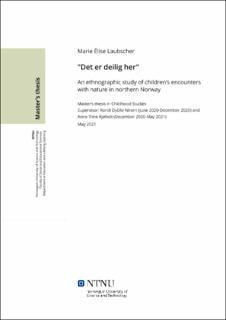"Det er deilig her" - an ethnographic study of children's encounters with nature in northern Norway
Master thesis
Permanent lenke
https://hdl.handle.net/11250/2784755Utgivelsesdato
2021Metadata
Vis full innførselSamlinger
Sammendrag
Denne avhandlingen er en etnografisk studie av barns møter med naturen I Nord-Norge. Med barneskole som setting, ble oppgaven formulert rundt deltakerobservasjoner av deltakerne. Oppgaven er skrevet innenfor det tverrfaglige forskningsfeltet Childhood Studies, og vektlegger derfor barn som kompetente aktører og informanter, I tillegg til å understreke at barndommen er mangfoldig og varierer over tid, sted og kultur.
Den allestedsnærværende naturen i Norge førte til at innbyggerne utviklet sterke og solide forhold til det naturlige miljøet. Å kunne takle og klare seg selv i naturen blir derfor sett på som en søyle i norsk kultur. Gjennom forskjellige offisielle publikasjoner og skoleplaner understreker den norske regjeringen viktigheten av barns tilgang til naturen. Dermed, sørger de for at læring om naturen og utvikling av praktiske ferdigheter for å takle den er noen av oppdragene til det offentlige utdanningssystemet.
Analysen og den analytiske diskusjonen tar sikte på å illustrere hvordan barn møter naturen, men også hvordan voksne formidler disse møtene. I tillegg vil begrepet ‘kulturanalyse’ brukes for å løse opp aspekter om ‘den gode norske barndommen’ og å lage en bro mellom teori og praksis ved å se på hvordan barns møter med naturen er en refleksjon av sterke norske kulturelle verdier.
Funnene avslører at barn møter naturen gjennom ulike pedagogiske og organiserte aktiviteter, men også selvdrevet og spontan praksis. De voksne på skolen formidlet barns møter med/av naturen ved å gi dem kunnskap om naturen, hjalp dem med å utvikle en bedre forståelse av passende klær, men lot dem også lære å takle naturen på en autonom måte. Ettersom barndommen blir sett på som en tid for prøving og eksperiment, oppfordres barn til å ta handling autonomt uten tilsyn av voksne. Ved å legge vekt på ulike lekaktiviteter og utforsking av det naturlige miljøet, bør 'robuste barn' være i stand til å takle naturen og håndtere ting på egenhånd for å gjengi noen oppmuntrede og verdsatte fremgangsmåter I det norske samfunnet. This thesis is an ethnographic study of children’s encounters with nature in northern Norway. The fieldwork used a primary school as setting and was articulated around participant observations. This thesis is written within the interdisciplinary research field of Childhood Studies, therefore emphasizing children as competent actors and informants and emphasizing how childhood is diverse and does vary across time, space and culture.
The omnipresence of nature in Norway led its inhabitants to develop strong and sturdy relationships to the natural environment. Therefore, being able to cope with and manage oneself in nature is seen as a pillar of the Norwegian culture. Through various official publications and school curricula, the Norwegian government states the importance of children’s access to nature, therefore ensuring that learning about nature and developing practical skills to cope in nature are some of the missions of the public education system.
The analysis and analytical discussion aim to illustrate how children do encounter nature, but also how adults do mediate these encounters. In addition, the concept of ‘cultural analysis’ will be used in order to unravel aspects about ‘the good Norwegian childhood’ and make a bridge between theory and practice by looking at how children’s encounters with nature are a reflection of strong Norwegian cultural values.
The findings reveal that children encounter nature through various pedagogical and organized activities, but also self-driven and spontaneous practices. The adults of the school did mediate children’s encounters with/of nature by providing them knowledge about nature, helping them develop a better understanding of the adequate clothing, but also let them learn how to cope with nature in an autonomous way. As childhood is seen as a time for trial and experiment, children are encouraged to take action autonomously without adult supervision. In this regard, by placing the emphasis on various play activities and the exploration of the natural environment, ‘robust children’ should be able to cope with nature and manage things on their own in order to reproduce some encouraged and valued practices in the Norwegian society.
